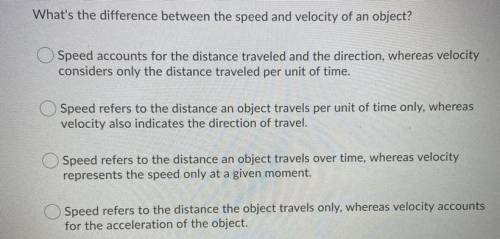
What’s the difference between the speed and velocity of an object?
A.) Speed accounts for the distance traveled and the direction, whereas velocity considers only the distance traveled per unit of time.
B.) Speed refers to the distance an object travels per unit of time only, whereas velocity also indicates the direction of travel.
C.)
Speed refers to the distance an object travels over time, whereas velocity represents the speed only at a given moment.
D.) Speed refers to the distance the object travels only, whereas velocity accounts for the acceleration of the object.


Answers: 3


Another question on Physics

Physics, 22.06.2019 14:30
Slab pull” is a type of tectonic plate movement that occurs due to the forces of mantle convection and results in the subduction of the lithosphere true or false
Answers: 2

Physics, 22.06.2019 20:20
An electron is trapped at a defect in a crystal. the defect may be modeled as a one-dimensional, rigid-walled box of width 1.00 nm. (a) sketch the wavefunctions and probability densities for the n 1 and n 2 states. (b) for the n 1 state, nd the probability of nding the electron between x1 0.15 nm and x2 0.35 nm, where x 0 is the left side of the box. (c) repeat (b) for the n 2 state. (d) calculate the energies in electron volts of the n 1 and n 2 states
Answers: 1

Physics, 23.06.2019 00:30
Two waves maximally constructively interfere at a point in space. among the options below, select the possible value of their phase difference at that point in space.a. zerob. πc. π/2d. not determinable by the information provided
Answers: 3

Physics, 23.06.2019 01:00
Learning goal: to understand newton's 1st law. newton's principia states this first law of motion: an object subject to no net force maintains its state of motion, either at rest or at constant speed in a right line. this law may be restated as follows: if the sum of all forces acting on an object is zero, then the acceleration of that object is zero. mathematically this is just a special case of the 2nd law of motion, f⃗ =ma⃗ , when f⃗ =0. when studying newtonian mechanics, it is best to remember the 1st law in two ways: if the net force (i.e., sum of all forces) acting on an object is zero, the object will keep moving with constant velocity (which may be zero). if an object is moving with constant velocity, that is, with zero acceleration, then the net force acting on that object must be zero. complete the following sentences to see if you can apply these ideas. part a if a car is moving to the left with constant velocity, one can conclude that
Answers: 1
You know the right answer?
What’s the difference between the speed and velocity of an object?
A.) Speed accounts fo...
A.) Speed accounts fo...
Questions



History, 15.12.2020 02:40

Mathematics, 15.12.2020 02:40

Arts, 15.12.2020 02:40

Physics, 15.12.2020 02:40

Mathematics, 15.12.2020 02:40

Chemistry, 15.12.2020 02:40

History, 15.12.2020 02:40


Biology, 15.12.2020 02:40


Biology, 15.12.2020 02:40


Spanish, 15.12.2020 02:40


Mathematics, 15.12.2020 02:40

History, 15.12.2020 02:40

History, 15.12.2020 02:40

Biology, 15.12.2020 02:40



